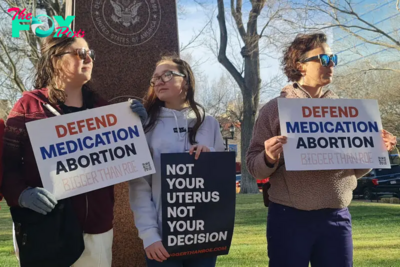Politics
Anti-abortion rights activists navigate a new, post-Roe landscape, as state bans mean they can ‘save babies’
It’s been nearly two years since the Supreme Court announced its Dobbs v. Jackson Women’s Health Organization ruling overturning federal protection for the right to an abortion, marking a momentous victory for anti-abortion activists. That decision was just the beginning – some anti-abortion groups, like Students for Life of America and the National Right to Life, would go on to advocate, in many cases successfully, for anti-abortion laws in every state.
After Dobbs, anti-abortion activists had a head start to their advocacy in 13 states, including Mississippi and South Dakota. State legislators in those places passed laws over the past few years to outlaw abortion shortly after a potential decision to overturn Roe v. Wade, which had given federal constitutional protection to abortion rights since 1973. Those laws, known as “trigger laws,” automatically banned abortion under most, if not all, circumstances once Roe was overturned in June 2022.
I am an American politics scholar who has interviewed nearly 50 anti-abortion activists from around the country over the past few years to understand how their activism has changed since the Dobbs decision.

Trigger law enforcement
Anti-abortion activists celebrated policy wins as some trigger laws quickly took effect in places like Tennessee and Missouri in 2022. But in other conservative states, like Kentucky and Utah, lawsuits challenging trigger laws prevented these laws from getting enforced.
Two abortion clinics filed a lawsuit in June 2022 challenging Kentucky’s 2019 trigger law, which banned abortion at all stages of pregnancy, with a few exceptions related to the health of the pregnant person.
In November 2022, Kentucky voters also rejected an amendment to the state constitution that would have doubled down on the trigger law, altogether removing the state constitutional right to get an abortion. One Kentucky anti-abortion activist I interviewed in May 2023 described “a lot of disappointment, a lot of sad faces” after this amendment’s failure. He stressed that the trigger law could still go into effect, though, because “the ballot initiative was just to make it constitutional.”
Anti-abortion activists celebrated a victory in 2023, though, when abortion clinics dropped their lawsuit against Kentucky’s trigger law, after the state Supreme Court ruled against some narrow aspects of their case.
‘More still needs to be done’
In Utah, meanwhile, the state’s 2020 trigger law banned abortion at all stages of pregnancy except under a few circumstances, including if the pregnant person’s health is at risk and in reported cases of incest and rape. Planned Parenthood and the American Civil Liberties Union of Utah first challenged this trigger law in court in July 2022.
Describing the post-Roe atmosphere, a Utah-based anti-abortion activist I interviewed in May 2023 said, “Unfortunately, in some circles, I think there’s a little bit of complacency that, you know, we had this win,” referring to Dobbs. “I think, unless you’re really involved in what’s going on, you may not realize how much still needs to be done.”
According to the activist, part of that work includes getting the state’s trigger law “across the finish line.”
While Utah’s trigger law remains held up in court as a result of the lawsuit, the state has another 2019 law that bans abortion in most cases after 18 weeks of pregnancy and remains in effect.
A ban that late in pregnancy is an unacceptable compromise for anti-abortion activists, who see their fight as one to defend all unborn life. While the trigger law remains on hold in Utah, anti-abortion groups urge their supporters to pray for an end to abortion in the state.
Anti-abortion activists in other states, such as Tennessee and Louisiana, which have some of the strictest trigger laws in the country, have also mobilized their supporters since June 2022 to help ensure that state legislatures did not weaken trigger laws.
Switching strategies and venues
In some states, trigger laws went into effect from June 2022 without court challenges or legislative amendments. Still, many anti-abortion groups find themselves on the defensive.
Arkansas’ trigger law went into effect in June 2022, making abortion illegal at all stages of pregnancy, with a few limited exceptions. An Arkansas activist I spoke with in June 2023 said the group was “blessed” to have the support of elected officials. At the same time, she recognized that “there are illegal abortions probably happening.”
“Really, our mission has not changed with Roe v. Wade being gone,” she said. “It’s changed, though, the landscape of it because in Arkansas we’re able to save babies. So we’ve been focusing now on providing services for women that we know will get pregnant, and educating them about the dangers of the abortion pill.”
Anti-abortion groups in Arkansas recognize the power in abortion rights ballot initiatives, however, which have become more common in 2023 and 2024.
In 2022, Ozark Right to Life, an anti-abortion group in Arkansas, asked supporters to call Kansans and encourage them to vote in favor of a state constitutional amendment. The amendment, originally proposed by state legislators, would have declared that there is no right to abortion in the state’s constitution.

Approximately 59% of Kansas voters rejected the amendment in August 2022.
Anti-abortion activists in Missouri prepared for a post-Roe era that would require them to defend existing state laws. In March 2023, Missouri Right to Life posted on Facebook that abortion rights activists wanted to put a constitutional amendment protecting abortion on the ballot. They encouraged their supporters to comment on the proposed amendment language.
It is unclear how much influence anti-abortion groups had in the amendment’s language, but the American Civil Liberties Union sued Missouri Secretary of State Jay Ashcroft for using misleading and biased language in the amendment’s summary. Missouri Right to Life defended Ashcroft’s description, which asked voters whether they want to “allow for dangerous, unregulated, and unrestricted abortions, from conception to live birth, without requiring a medical license or potentially being subject to medical malpractice.”
In 2023, a Missouri judge tossed out this description and rewrote the summary.
Anti-abortion groups in Arkansas and Missouri are now running “decline to sign” campaigns to prevent abortion rights initiatives from getting on their states’ ballots in November 2024.
The Arkansas ballot initiative would protect the right to abortion before 18 weeks of pregnancy or in the case of rape, incest, fatal fetal anomaly, or to protect the health of the pregnant person. The so-called Missouri reproductive freedom amendment would allow the state to regulate abortion after fetal viability, which tends to occur around 24 weeks of pregnancy.
Despite the efforts of some anti-abortion activists, abortion rights groups in both Arizona and Missouri say they have enough signatures to put abortion on the ballot in November and enshrine reproductive rights in their state constitutions.
Given the previous outcomes of abortion-related ballot initiatives, which have largely restored abortion rights, anti-abortion activists face an uphill battle.
-

 Politics3h ago
Politics3h agoHow the Biden Administration Protected Abortion Pill Access—and What Trump Could Do Next
-

 Politics3h ago
Politics3h agoWhy Trump’s Tariffs Could Raise Grocery Prices
-

 Politics14h ago
Politics14h agoThe First Trans Member of Congress Expected Pushback Like Mace’s Bathroom Rule
-

 Politics14h ago
Politics14h agoNew York Prosecutors Oppose Dismissing Trump’s Hush Money Conviction
-

 Politics20h ago
Politics20h agoWhite House Christmas Tree Is a Symbol of Resilience for Hurricane-Hit North Carolina Farms
-

 Politics1d ago
Politics1d agoHakeem Jeffries Wins Reelection as House Democratic Leader Despite Party’s Losses
-

 Politics1d ago
Politics1d agoHow Grover Cleveland’s Grandson Feels About Donald Trump Becoming the Second U.S. President to Serve Nonconsecutive Terms
-

 Politics1d ago
Politics1d agoAs Trump Seeks Mass Deportations, Workplace Raids May Not Help Much
















